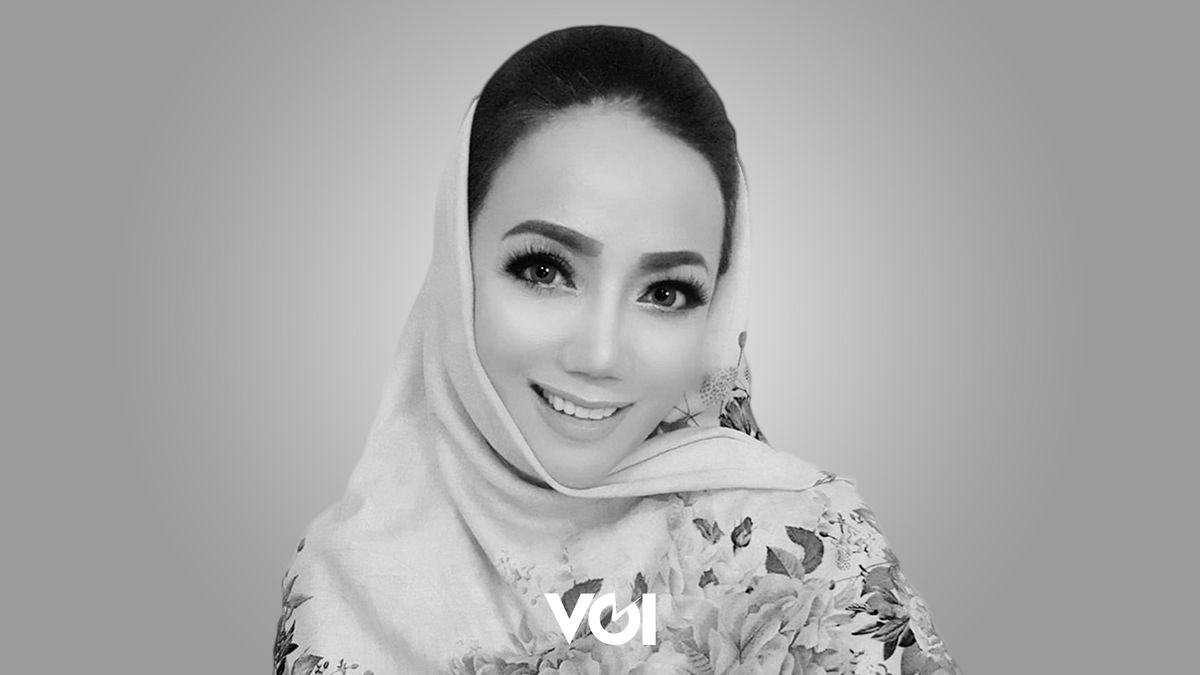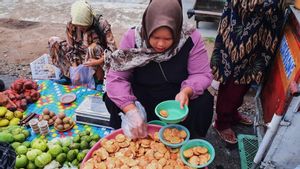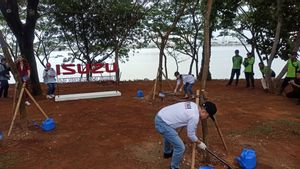JAKARTA - Amy Atmanto is a designer who has worked in the fashion industry. In the modest fashion section, his name stands at the forefront where he creates many kaftan and embroidery designs that have gone international.
The COVID-19 pandemic has hit all walks of life, fashion is no exception. Even so, Amy Atmanto is grateful to be able to undergo several routines that help develop modest fashion.
“My business remains as usual at the Royal Group. At the end of last year we made a special tvc (advertisement) for hijab, there were eturia scarf and eturia hijab. Thank God, even though it's new from Royal, it's already in great demand because modest Muslim hijab fashion is big," said Amy Atmanto, opening the conversation.
Modest fashion has the meaning of a closed fashion style that does not expose the body excessively. Currently, the modest fashion industry has developed, especially in Indonesia, where the majority of the Muslim community is.

Amy Atmanto realizes the huge potential for Indonesia to dominate this market. He also understands that there are many reasons why Indonesia can compete in the international fashion industry.
“Modest fashion in our country is getting more and more popular because there are many local MSME actors, both MSMEs and industries. Especially with the use of strong wastra cloth with intrinsic value," said Amy Atmanto with enthusiasm.
"From the value fabric to the fashion style, we have everything. We are very rich. That's Indonesia's advantage, so we are also very positive that we hope that we can dominate the world's global market. Become a major player in the global market with modest fashion. It's like hijab, robes, and extraordinary," he said.
Amy claims that she is the one who developed the kaftan to become popular in Indonesia. Through her brand Royal Kaftan, Amy has experience making for a number of public figures and important figures such as the Vice President of Indonesia - Wury Ma'ruf Amin, Krisdayanti, Rosiana Silalahi, and many others.

With these experiences, Amy Atmanto believes that modest fashion in Indonesia can be on par with competitors. He explained that currently Turkey is leading the ranking of modest fashion in the world with 29 billion dollars, followed by the UAE with 23 billion dollars, then Indonesia with 21 billion dollars.
“Fashion is very broad, and the government is promoting modest fashion, especially when it is big in Indonesia, especially Muslims. Now it's a bit difficult for us to import raw materials because we are constrained by shipping. In fact, this is a good moment for creative work and producers to produce innovative works in the country," he said.
The designer who was born on August 19 admits that he is still productive in the midst of a difficult situation like now, but it is undeniable that he has experienced a number of challenges during the pandemic. Starting from the lack of raw materials to the difficulty of finding craftsmen, Amy Atmanto still feels at this time.
"So, since last week, there were several companies asking for hundreds of these designs, but when we look for goods from craftsmen, the raw materials are not available. Sometimes it's too little to meet hundreds of requests from one company. That's a problem," Amy explained.
Modest Fashion Potential

Amy Atmanto said there were difficulties in finding raw materials from each region in Indonesia to develop modest fashion. Therefore, he hopes that there will be a synergy with the government which is actively conducting training for MSMEs.
"Now, all corporate companies foster craftsmen, we have to look for that. Don't let us lack the uniqueness of Indonesia, namely wastra. We talk about wanting to be innovative and creative in our work, but the materials we want to brand in the fashion industry are rare," he explained.
“Consumers are smart, they already know which ones are good to wear. If we make our own, we can (create a market) by training MSME players from color, design so that we can produce creative works with global taste," he said.

Not only in terms of fashion, Amy Atmanto also expects the government's contribution to develop modest fashion. Many local brands use interesting concepts, but few really attract attention but have not received attention.
"The government is supportive with modest fashion, the attention is extraordinary, so it's not just a handful of people who are ready. When there is demand, the domestic industry is ready. A lot of good stuff, a lot of work, a lot of creative designers, "said Amy Atmanto.
Despite all the challenges, modest fashion in Indonesia will continue to grow. Not infrequently we encounter various modest fashion themed events in the capital city. There are also many brands that open sales to overseas.

Seeing conditions like this, Amy Atmanto wants people to start realizing the magnitude of the flow of modest fashion. This concept is not limited by religion but still polite in appearance.
“I use modest fashion to encourage our mindset to explore creative areas beyond traditional outfits with this term. We are not limited by the general concept of Muslim clothing, but modest robes. Modest is polite. So the market is global," said Amy.
There is still a long way to go, making Amy Atmanto optimistic that one day Indonesia can lead the modest fashion industry. He said there are many factors that other actors do not have, ranging from culture, quality, to SMEs.
However, this success must be accompanied by government support that is willing to develop the market. By increasing the number of craftsmen and fostering the community, Amy believes that the local modest fashion market will slowly increase rapidly.
"I just hope that Indonesia's modest fashion will be noticed by the world because we have a uniqueness that other players don't have. So I want modest fashion shifting to global," concluded Amy Atmanto.
The English, Chinese, Japanese, Arabic, and French versions are automatically generated by the AI. So there may still be inaccuracies in translating, please always see Indonesian as our main language. (system supported by DigitalSiber.id)












